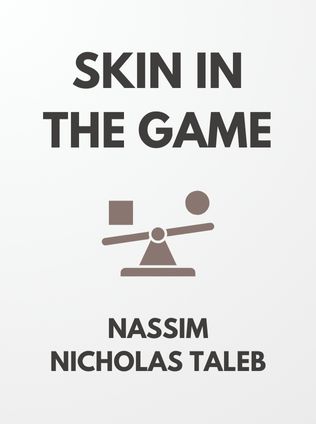
Skin in the Game
The Hidden Asymmetries in Daily Life
By Nassim Nicholas Taleb
Published 06/2018
About the Author
Nassim Nicholas Taleb is a polymath—an author, scholar, and former trader—known for his deep exploration of randomness, uncertainty, and risk. Born in Lebanon in 1960, Taleb's career has spanned continents and disciplines, all unified by his focus on how unpredictable events shape our lives. Taleb's work is especially resonant in the context of global finance, ethics, and decision-making. His Incerto series, which includes Fooled by Randomness, The Black Swan, Antifragile, The Bed of Procrustes, and Skin in the Game, is a philosophical journey that challenges conventional beliefs about knowledge and the human condition.
Main Idea
Skin in the Game is the fifth book in Taleb's Incerto series, and it delves into the ethics of risk-taking in an uncertain world. The central premise of the book is that ethical behavior and good decision-making are rooted in having "skin in the game," meaning that one must have a personal stake in the outcomes of their actions. Taleb argues that systems and people without skin in the game are doomed to failure because they are disconnected from the consequences of their actions.
In Taleb's view, the world is fundamentally unpredictable, and those who act without considering the risks they impose on others are not only unethical but dangerous. The concept of skin in the game is not just about fairness but also about survival, as it encourages a deeper connection between actions and consequences. Taleb applies this concept to a wide range of areas, including business, politics, religion, and personal ethics.
Table of Contents
- Origins of "Skin in the Game"
- Why Put Skin in the Game?
- How Skin in the Game Makes the World Better
- How a Lack of Skin in the Game Makes the World Worse
- Philosophical Implications of Skin in the Game
Origins of "Skin in the Game"
The concept of "skin in the game" first gained prominence in Taleb's earlier work, Antifragile, where it was a key component of his broader philosophy. Taleb's idea is that systems, people, and ideas that have skin in the game—that is, they bear the risk and consequences of their actions—are more robust and ethical. In Skin in the Game, Taleb expands on this idea, arguing that skin in the game is essential for any system to function ethically and effectively.
Taleb illustrates this with the example of a rodeo rider versus a spectator. The rider, who risks injury, has skin in the game, whereas the spectator, safely observing, does not. This distinction is crucial because it determines who is truly invested in the outcome and who can make decisions with a clear understanding of the risks involved.
Moreover, Taleb criticizes those who make decisions that affect others without having skin in the game themselves. He argues that such individuals—whether they are politicians, corporate executives, or intellectuals—often make poor decisions because they are insulated from the consequences. This detachment, according to Taleb, leads to systemic failures and ethical lapses.
Why Put Skin in the Game?
Taleb believes that having skin in the game is not only ethical but also practical. It allows individuals and systems to learn from their mistakes, fosters better work and decision-making, and encourages ethical behavior. He posits that knowledge gained through direct experience is more valuable than abstract reasoning because it is grounded in reality and the consequences of one's actions.
For example, Taleb discusses how systems improve by eliminating components that do not work. In a business context, if failing companies were continually bailed out, they would never improve, leading to a landscape filled with suboptimal businesses. Similarly, when people have skin in the game, they are more likely to engage fully, make better decisions, and behave ethically.
Sign up for FREE and get access to 1,400+ books summaries.
You May Also Like
The Subtle Art of Not Giving a F*ck
A Counterintuitive Approach to Living a Good Life
By Mark MansonRich Dad Poor Dad
What the Rich Teach Their Kids About Money - That the Poor and Middle Class Do Not!
By Robert T. KiyosakiHow To Win Friends and Influence People
The All-Time Classic Manual Of People Skills
By Dale CarnegieFreakonomics
A Rogue Economist Explores the Hidden Side of Everything
By Steven D. Levitt and Stephen J. Dubner



















